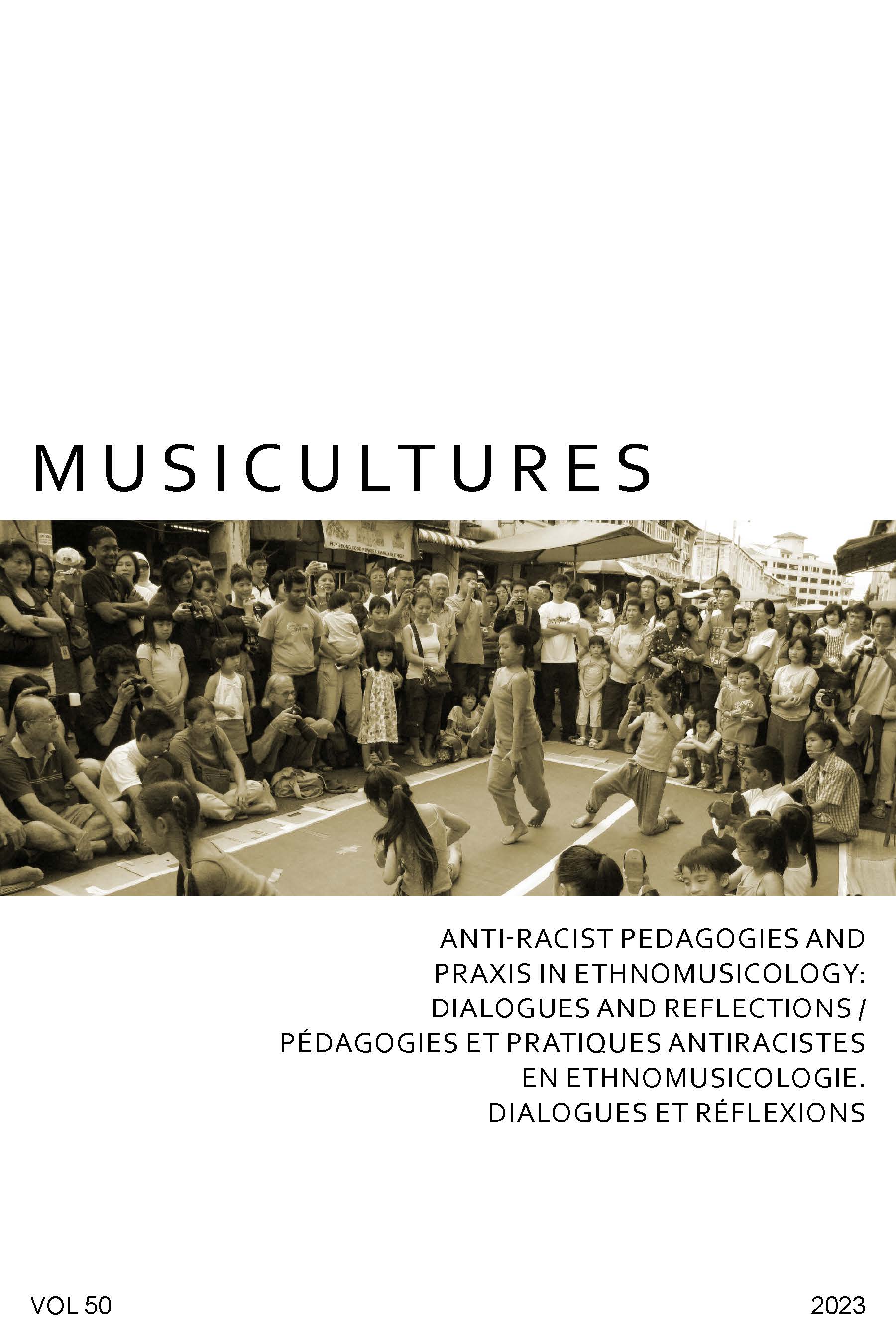References
Ascenso, Sara, Rosie Perkinsa, Louise Atkinsa, Daisy Fancourta, and Aaron Williamon. 2018. Promoting Well-Being through Group Drumming with Mental Health Service Users and Their Carers. International Journal of Qualitative Studies on Health and Well-Being 13:1–15.
Bensimon, Moise, Dorit Amir, and Yuval Wolf. 2008. Drumming Through Trauma: Music Therapy with Post-Traumatic Soldiers. The Arts in Psychotherapy 35 (1): 34–48.
Campbell, Patricia Shehan, and Chee Hoo Lum. 2019. World Music Pedagogy, Vol. 6, School-Community Intersections. New York: Routledge.
Carter-Ényì, Quintina, Aaron Carter-Ényì, and Kevin Nathaniel Hylton. 2019. How We Got into Drum Circles, and How to Get Out: De-Essentializing African Music. Intersections 39 (1): 73–92.
Charry, Eric. 2005. Introduction to The Beat of My Drum: An Autobiography, by Babatunde Olatunji, Robert Atkinson, and Akinsola Akiwowo, 1–26. Philadelphia: Temple University Press.
Coppola, William J., David G. Herbert, and Patricia Shehan Campbell. 2020. World Music Pedagogy, Vol. 7, Teaching World Music in Higher Education. New York: Routledge.
Cremata, Radio. 2017. Facilitation in Popular Music Education. Journal of Popular Music Education 1 (1): 63–82.
Drum Café India. n.d. Why Drums. https://drumcafe.in/why-drums/ (accessed August 19, 2021). Ethnomusicology in Action. n.d. Home Page. http://www.ethnomusicologyinaction.org/ (accessed January 30, 2023).
Faulkner, Simon. 2021. Drum Circles for Specific Population Groups. London: Jessica Kinglsey.
Florida, Richard. 2012. The Rise of the Creative Class, Revisited. New York: Basic Books.
Grode, Eric. 2005. Drumming for Fun and Profit. New York Times. May 15, 2005. https://www.nytimes.com/2005/05/15/theater/newsandfeatures/drumming-forfun- and-profit.html (Accessed August 19, 2021).
Higgins, Lee, and Lee Willingham. 2017. Engaging Community Music: An Introduction. New York: Routledge.
Howell, Gillian, Lee Higgins, and Brydie-Leigh Bartleet. 2017. Community Music Practice: Intervention Through Facilitation. In The Oxford Handbook of Music Making and Leisure, 601–18. Ed. Roger Mantie and Gareth Dylan Smith. New York: Oxford University Press.
Hull, Arthur. 2007. Drum Circle Facilitation: Building Community Through Rhythm. Santa Cruz, CA: Village Music Circles.
Hull, Arthur. 2014. Rhythmical Alchemy Playshop: Drum Circle Games. Santa Cruz, CA: Village Music Circles.
Onishi, Pamela Costes. 2014. Drumming for Community Building: The Development of the Community Drumming Network (CDN) and Its Impact in Singapore Society. International Journal of Community Music 7 (3): 299–317.
Pavlicevic, Mercedes. 1997. Music Therapy In Context: Music, Meaning and Relationship. Philadelphia: Jessica Kingsley.
Pravaz, Natasha. 2009. The Well of Samba: On Playing Percussion and Feeling Good in Toronto. Canadian Ethnic Studies Journal 41 (3): 207–32.
Rhythm2Recovery. 2016. Fact Sheet: Rhythm Interventions for Aboriginal People. www.rhythm2recovery.com/wp-content/uploads/2016/07/Fact-sheet-Rhythmfor- working-with-Aboriginal-Peoples-PDF.pdf (accessed August 19, 2021).
Snow, Shelley, and Miranda D’Amico. 2010. The Drum Circle Project: A Qualitative Study with At-Risk Youth in a School Setting. Canadian Journal of Music Therapy 16 (1): 12–39.
Sterne, Jonathan, and Emily Dolan. 2020. COMS 608/MUSG 694 (McGill) / HMAN 2400Z (Brown) Instruments and Instrumentalities. Course
syllabus, McGill University, Montreal and Brown University, Providence. https://sterneworks.org/wp-content/uploads/2021/05/Instruments-and-InstrumentalitiesFall2020Final.pdf (accessed November 7, 2023).
Stevens, Christine. 2003. The Art and Heart of Drum Circles. Milwaukee: Hal Leonard.
Tuck, Eve, and K. Wayne Yang. 2012. Decolonization Is Not a Metaphor. Decolonization: Indigeneity, Education and Society 1 (1): 1–40.
Winkelman, Michael. 2003. Complementary Therapy for Addiction: “Drumming Out Drugs.” American Journal of Public Health 93 (4): 647–51.
- The author retains copyright over the work.
- The author grants the journal owner (The Canadian Society for Traditional Music / La Société canadienne pour les traditions musicales) an exclusive license to publish the work.
- The author may post a pre-print or post-print version of the work (see definitions below) on a personal website for up to twelve months after the work is published in MUSICultures. After twelve months, the pre-print version must be replaced with the published version.
- The author may deposit the published PDF of the work in a non-commercial online repository twelve months after the work is published in MUSICultures, or any time thereafter.
- Any such deposit must include a link to the work on the MUSICultures website, e.g., https://journals.lib.unb.ca/index.php/MC/article/view/19996
A pre-print is a work-in-progress—a contribution not yet accepted, or perhaps even submitted, to MUSICultures.
A post-print is the version of a contribution after peer review and acceptance by MUSICultures, with revisions completed.
The published version is the PDF file of a contribution as it appears in MUSICultures.
Please note that academia.edu and ResearchGate.com are both for-profit repositories; authors may not deposit the published PDF of the work in these repositories until after the journal’s embargo period.
For permission to reprint or translate material from MUSICultures, please contact Heather Sparling, General Editor of MUSICultures (heather_sparling@cbu.ca).

